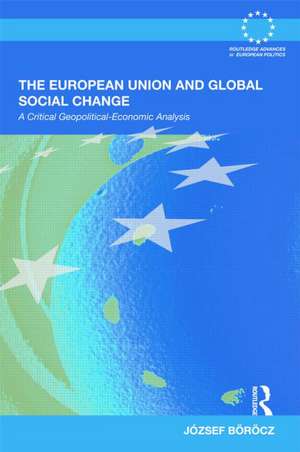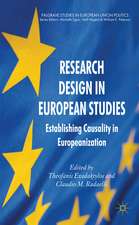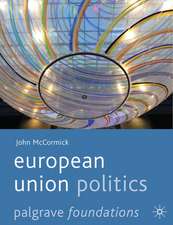The European Union and Global Social Change: A Critical Geopolitical-Economic Analysis: Routledge Advances in European Politics
Autor József Böröczen Limba Engleză Hardback – 14 aug 2009
- Interprets the ongoing transformation of west European public authority in the context of the global geopolitical economy of competition, cooperation and conflict
- Examines the consequences of west European integration for the global system in a longue-durée perspective, developing a new, geopolitical dialect within world-systems analysis, sharpening some of the conceptual tools developed by its paradigm-setters.
- Develops a new conceptualization for the EU’s global geopolitical strategy, which the author describes this strategy as the elasticity of size
| Toate formatele și edițiile | Preț | Express |
|---|---|---|
| Paperback (1) | 198.33 lei 6-8 săpt. | |
| Taylor & Francis – 30 iun 2010 | 198.33 lei 6-8 săpt. | |
| Hardback (1) | 393.26 lei 6-8 săpt. | |
| Taylor & Francis – 14 aug 2009 | 393.26 lei 6-8 săpt. |
Din seria Routledge Advances in European Politics
-
 Preț: 324.96 lei
Preț: 324.96 lei -
 Preț: 311.41 lei
Preț: 311.41 lei -
 Preț: 324.87 lei
Preț: 324.87 lei -
 Preț: 364.22 lei
Preț: 364.22 lei -
 Preț: 137.51 lei
Preț: 137.51 lei -
 Preț: 285.03 lei
Preț: 285.03 lei - 9%
 Preț: 1037.85 lei
Preț: 1037.85 lei - 18%
 Preț: 1112.03 lei
Preț: 1112.03 lei - 18%
 Preț: 999.64 lei
Preț: 999.64 lei - 18%
 Preț: 1058.79 lei
Preț: 1058.79 lei - 18%
 Preț: 1055.69 lei
Preț: 1055.69 lei -
 Preț: 326.03 lei
Preț: 326.03 lei - 18%
 Preț: 1007.36 lei
Preț: 1007.36 lei - 18%
 Preț: 1060.87 lei
Preț: 1060.87 lei - 18%
 Preț: 1010.60 lei
Preț: 1010.60 lei - 18%
 Preț: 1057.13 lei
Preț: 1057.13 lei - 18%
 Preț: 1057.61 lei
Preț: 1057.61 lei - 18%
 Preț: 1059.93 lei
Preț: 1059.93 lei - 18%
 Preț: 1061.93 lei
Preț: 1061.93 lei - 18%
 Preț: 998.40 lei
Preț: 998.40 lei - 18%
 Preț: 1114.64 lei
Preț: 1114.64 lei - 18%
 Preț: 1058.43 lei
Preț: 1058.43 lei - 18%
 Preț: 1112.03 lei
Preț: 1112.03 lei - 18%
 Preț: 1057.75 lei
Preț: 1057.75 lei - 18%
 Preț: 1055.21 lei
Preț: 1055.21 lei -
 Preț: 370.71 lei
Preț: 370.71 lei - 18%
 Preț: 1050.02 lei
Preț: 1050.02 lei - 18%
 Preț: 1001.55 lei
Preț: 1001.55 lei - 18%
 Preț: 973.89 lei
Preț: 973.89 lei - 25%
 Preț: 828.12 lei
Preț: 828.12 lei - 18%
 Preț: 1060.25 lei
Preț: 1060.25 lei - 18%
 Preț: 706.91 lei
Preț: 706.91 lei - 18%
 Preț: 1273.35 lei
Preț: 1273.35 lei -
 Preț: 394.19 lei
Preț: 394.19 lei - 18%
 Preț: 1057.13 lei
Preț: 1057.13 lei - 18%
 Preț: 1059.93 lei
Preț: 1059.93 lei - 18%
 Preț: 1058.79 lei
Preț: 1058.79 lei - 18%
 Preț: 952.31 lei
Preț: 952.31 lei - 18%
 Preț: 1057.75 lei
Preț: 1057.75 lei - 18%
 Preț: 1054.71 lei
Preț: 1054.71 lei - 18%
 Preț: 1059.84 lei
Preț: 1059.84 lei - 28%
 Preț: 823.63 lei
Preț: 823.63 lei - 26%
 Preț: 765.01 lei
Preț: 765.01 lei - 18%
 Preț: 947.36 lei
Preț: 947.36 lei - 18%
 Preț: 1113.95 lei
Preț: 1113.95 lei - 16%
 Preț: 248.97 lei
Preț: 248.97 lei -
 Preț: 352.36 lei
Preț: 352.36 lei - 26%
 Preț: 822.36 lei
Preț: 822.36 lei
Preț: 393.26 lei
Nou
Puncte Express: 590
Preț estimativ în valută:
75.25€ • 78.57$ • 62.28£
75.25€ • 78.57$ • 62.28£
Carte tipărită la comandă
Livrare economică 04-18 aprilie
Preluare comenzi: 021 569.72.76
Specificații
ISBN-13: 9780415481021
ISBN-10: 0415481023
Pagini: 256
Ilustrații: 57 b/w images and 57 line drawings
Dimensiuni: 156 x 234 x 23 mm
Greutate: 0.54 kg
Ediția:1
Editura: Taylor & Francis
Colecția Routledge
Seria Routledge Advances in European Politics
Locul publicării:Oxford, United Kingdom
ISBN-10: 0415481023
Pagini: 256
Ilustrații: 57 b/w images and 57 line drawings
Dimensiuni: 156 x 234 x 23 mm
Greutate: 0.54 kg
Ediția:1
Editura: Taylor & Francis
Colecția Routledge
Seria Routledge Advances in European Politics
Locul publicării:Oxford, United Kingdom
Public țintă
Postgraduate and UndergraduateCuprins
1. Global Economic Weight in the Longue Durée: Nemesis of West European Geopolitics 2. Segments to Regions: Structural Transformation of Global Governance 3. Geopolitics of Property Relations: State Socialism under Global Capitalism 4. Elasticity of Weight: The EU as a Geopolitical Animal
Notă biografică
József Böröcz is Professor of Sociology at Rutgers University, USA; Faculty Associate of the Center for Migration and Development at Princeton University; and Scholarly Advisor at the Institute for Political Studies of the Hungarian Academy of Sciences. His publications include Leisure Migration: A Sociological Analysis; (as co-editor) A New World Order? Global Transformation in the late 20th Century and Empire’s New Clothes: Unveiling Eastern Elargement.
Further details can be found at his website: http://borocz.net
Further details can be found at his website: http://borocz.net
Recenzii
This book received an "Honorable Mention" in the 2011 book award competition of the Political Economy of the World-System section of the American Sociological Association.
'There are few books that can offer such broad historical and geographical scope in an attempt to understand the present-day European Union. In the author’s terms the book aims “to reconstruct the European Union’s historical geopolitical genealogy by situating its emergence within the historical context of global capital and modern west European statehood” (p. 2). This is in fact an underestimation of its ambition; the book also successfully places the EU in the context of the colonial legacy of European nation-states, on which count alone its makes a very significant addition to the literature.' - Chris Rumford, University of London in the American Journal of Sociology
'Böröcz opens up exciting new directions for research on the European Union and provides novel analytical and quantitative tools for social criticism. As such, the book will be very useful to graduate students and, thanks to the clarity of its arguments and language, even to advanced undergraduates in history and the social sciences. I anticipate that students of state and postsocialism will also be inspired to carry out analogous inquiries into the relationships between the former Second and Third World. Overall, this is a must-read for students of globalization, colonialism, and postsocialism, and it will certainly hold great appeal to scholars interested in world-systems theory, economic sociology, postcolonial studies, and comparative-historical methods.' - Zsuzsa Gille, Journal of World-Systems Research, 17: 2
'This book offers a truly provocative and thoughtful historical-sociological macroanalysis of global social change concerning the last 500 years. The reader is constantly reminded that mainstream (and even not so mainstream) knowledge and ideas s/he has learnt concerning the rise (and the current fall) of Europe and the West are not only wrong – as they are biased and mis-focused reflections of reality – but also deceptive. They mislead not only interested scholars and students of macro-historical structures, but also those politicians, business people and geopolitical experts who truly want to see why Europe and the West are losing power and control, regardless of their previous privileged position.' - Attila Melegh, International Sociology Review of Books 27(2)
'There are few books that can offer such broad historical and geographical scope in an attempt to understand the present-day European Union. In the author’s terms the book aims “to reconstruct the European Union’s historical geopolitical genealogy by situating its emergence within the historical context of global capital and modern west European statehood” (p. 2). This is in fact an underestimation of its ambition; the book also successfully places the EU in the context of the colonial legacy of European nation-states, on which count alone its makes a very significant addition to the literature.' - Chris Rumford, University of London in the American Journal of Sociology
'Böröcz opens up exciting new directions for research on the European Union and provides novel analytical and quantitative tools for social criticism. As such, the book will be very useful to graduate students and, thanks to the clarity of its arguments and language, even to advanced undergraduates in history and the social sciences. I anticipate that students of state and postsocialism will also be inspired to carry out analogous inquiries into the relationships between the former Second and Third World. Overall, this is a must-read for students of globalization, colonialism, and postsocialism, and it will certainly hold great appeal to scholars interested in world-systems theory, economic sociology, postcolonial studies, and comparative-historical methods.' - Zsuzsa Gille, Journal of World-Systems Research, 17: 2
'This book offers a truly provocative and thoughtful historical-sociological macroanalysis of global social change concerning the last 500 years. The reader is constantly reminded that mainstream (and even not so mainstream) knowledge and ideas s/he has learnt concerning the rise (and the current fall) of Europe and the West are not only wrong – as they are biased and mis-focused reflections of reality – but also deceptive. They mislead not only interested scholars and students of macro-historical structures, but also those politicians, business people and geopolitical experts who truly want to see why Europe and the West are losing power and control, regardless of their previous privileged position.' - Attila Melegh, International Sociology Review of Books 27(2)
Descriere
This book provides an historical analysis of what the European Union is. Examining the development of the EU in a global context, the book draws on long-term processes of change in historical depth to developing a deeper understanding of global social change.























